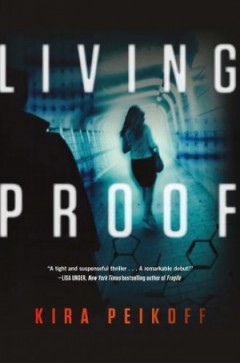Living Proof is the opera prima of Kira Peikoff, the daughter of Ayn Rand’s intellectual heir, Leonard Peikoff. In it, Peikoff uses a near-future setting to explore the logical conclusion of certain prolife arguments with which she disagrees. The plot of this thriller is well-structured and the writing, notwithstanding the occasional imperfection, is decent. However, in the end it gave me the same feeling I get from a dish made from good ingredients that nevertheless wants salt. Or pepper. Or oregano. Or something.
Arianna — a protagonist in the Randian tradition — is a brave, rational, free-thinking and beautiful doctor working at a fertility clinic in New York City in the year 2028. Embryos have been given the same legal status as human beings, and the Department of Embryo Protection is tasked with making sure that embryos not used in implantation are frozen and taken care of instead of being disposed of. The DEP chief becomes suspicious of Arianna when her clinic experiences a sudden and inexplicable surge in popularity. He sends Trent Rowe undercover to earn Arianna’s trust so he can find out what she is up to and if she is “murdering” embryos. What Trent discovers will challenge his beliefs, and he must make a choice between what he was raised to believe, and what Arianna has taught him.
Peikoff’s prose is decent, although she occasionally misuses words, which sound like notes of a melody played flat. On page 58, for instance, she uses “pretext” when she means “pretense.” On page 55 she uses “oblivion” when she cannot possibly have meant it.
She also has an affinity for metaphors, some of which go off well and help elucidate an idea. For instance, on page 261 she writes, “But recently the cells had been tantalizingly close to the goal, developing as astrocytes or microglia instead of oligodendrocytes, like Cokes instead of Diet Cokes.” However, there are just as many times when no metaphor is needed, or the one she chooses takes the reader out of the story. A good example is on page 163, where a character is said to be “trapped in an ethical straitjacket, laced tight with emotional strings.” It is not that the metaphor cannot convey the idea, but the particular one used seems a little silly and distracting, like a knowledgeable professor whose belly spills over the waistline of the pants he bought when he was 40 pounds lighter.
Quibbles aside, the novel generally reads smoothly and the story it tells has a solid structure. We are hooked into the plot, and know the stakes, when Trent is given the task of infiltration. Moral dilemmas develop, a few obstacles are put in his way and a sense of urgency is introduced as time begins to run out on both sides, for different reasons. Finally, everything leads to a climax with a short resolution afterwards.
The author undeniably has a grasp on this aspect of storytelling, but the story lacked the impact it might have had. The characters tend to be bland, often representing aggregates of young urban professionals rather than being unique individuals. When the characters are not bland, they lean towards the implausible, such as the head of the DEP who turns out to be a devoutly religious crusader who is enraged at the idea of the disposal of embryos. A little cartoonish, he would probably better represent the activists who lobbied to protect embryos rather than the police and bureaucrats who enforce the laws. There was only one character whom I truly found interesting, and this lack of engagement robs the story of appeal.
There were also a lot of insipid throwaway scenes, usually taking the form of a brief visit to a character to remind us that he is still in the story. During these scenes, the character does little or nothing, but we visit his thoughts to review how he feels about the situation. The story might be scrubbed clean of these bits and come out better for it.

One final thing that distanced me from the story were a few unlikely actions taken by the characters. For instance, to aid Trent in his infiltration, his family and the family of his boss are brought in to stage a dinner for Arianna. The problem is, many of them have to pose as people they are not to maintain Trent’s deceptions, but these are normal people, untrained and unused to this sort of counter-intelligence game. I find it difficult to believe that real investigators would even think to use a tactic like this.
There is a Randian flare for the dramatic that pops up now and then, such as when Arianna begins to take piano lessons and the notes she plays, even from simple scales, are described in effusive terms, leaping from her delicate and deft fingers. Her very soul can be felt even in these simple warm ups, something that I have never experienced in real life but have run into many times in Ayn Rand’s stories. Whether or not this is a flaw I suppose is up to the reader, but I rolled my eyes at it. The ghost of Rand definitely informs much of the work, whether it be the Romantic departures from realism, the praise of reason, the denigration of religion, or the theme of the oppressive state hampering people of quality from making the world a better place. Absent is the virtue of selfishness, which is fine by me.
SPOILER SPOILER SPOILER
One last mention might be made of that spice that seemed to be missing. The story went through the proper motions of buildup and climax, but there was nothing truly arresting. When Trent finds himself unsure of which side he is on and starts lying to both sides, more might have been made of his predicament. There were a few obstacles and character responses to them, but not as much as I felt the story needed. There were no unforeseen twists and no momentum changes. Once the stakes are known, the reader already has a good idea of how things will play out.
END OF SPOILERS
I enjoyed the book, though I was not captivated by it. Being a first work, it leaves some room for improvement but also demonstrates definite skill. A reader could do far worse than invest some time in Living Proof, and might do well to keep an eye on Kira Peikoff. If her sophomore effort improves on some of the weak points mentioned here, it could be a very fine work.















